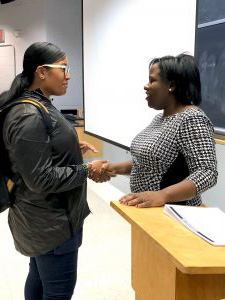Helping Children Get a Better Start
Alumnae News

Published November 2, 2018
Lucine Petit Francis ’04 says she’s always been a little nosy.
 The first-generation Haitian American says being nosy prompted her to learn to speak Haitian Creole, the only language her grandmother spoke, so she would understand what she was talking about. And it may also be why she has a passion for research—the desire to understand what is really going on and why.
The first-generation Haitian American says being nosy prompted her to learn to speak Haitian Creole, the only language her grandmother spoke, so she would understand what she was talking about. And it may also be why she has a passion for research—the desire to understand what is really going on and why.
Francis is currently the Morton K. and Jane Blaustein Postdoctoral Fellow in Mental Health and Psychiatric Nursing at Johns Hopkins School of Nursing, where she devotes all her time to her research that centers on health issues for children living in poverty. Right now, she is focusing on nutrition and obesity.
While a neuroscience major at Smith, she had planned to attend medical school, but instead opted for the PhD nursing program at Johns Hopkins. “I was really passionate about health and educating people about health,” she says, “so I decided to go to nursing school, which was the best thing that ever happened to me.”
Francis, who is married to an engineering professor at George Washington University and is the mother of two small children, talks about her research, how her time at Smith influenced her career path, and why she is proud to be part of the nursing profession.
What does the data tell us about nutrition and children living in poverty?
One of the biggest health issues that we see with children living in underserved areas in the urban community is the issue of childhood obesity. Almost a quarter of young children aged 2 to 5 are considered overweight or obese. Children who are obese are more likely to be obese into their adulthood, and they’re more likely to have chronic issues like hypertension and diabetes. My goal is to find a way to engage families who live in low-income areas and find a way to engage them so that they understand the seriousness of the implications of their children being obese or overweight.
How are you studying this issue?
I’m focused on home-based day care in Baltimore City and looking at how we can support family child-care providers in providing better nutrition and physical activity environments for young children.
 What do you think are the major contributors to obesity in the population that you’re studying?
What do you think are the major contributors to obesity in the population that you’re studying?
Obesity is a systems issue. We can look at it from both the macro and micro level. On the macro level, neighborhoods that are under resourced may not even have a supermarket, and it may be difficult for families to have access to fresh fruits and vegetables. In a place with high crime, like Baltimore City, there may not be a safe space for children to go outside and engage in physical activity. At the micro level is the cultural environment in the home. There are issues of time and culture. Families who live in poverty tend to have jobs that are not flexible. When they come home, they don’t have that time to cook nutritious meals. They find something convenient. Usually those types of foods are high in calories, fat and sugar. It’s an interconnected issue.
How is the rate of obesity and its causes different for those in higher socioeconomic brackets?
Obesity does not discriminate. If you’re well-resourced, yes, you may have access to foods that are considered appropriate to feed children, but working parents still may find it difficult to have dinner with their children and to provide foods that are nutritious. It’s not only about what you offer the child, but it’s also about the environment of healthy eating and messaging that you set in the home. These are challenges whether you’re resource poor or whether you have access to resources.
What are some of the factors that have contributed to the rise of obesity?
The fast-food market has gotten quite sophisticated in targeting children, and we have the epidemic of sugary beverages, which has been shown to be a huge contributor to childhood obesity. Also, the rate of children’s physical activity has gone down.
What have your results shown so far?
Overall, results show a lack of comprehensive written nutrition and physical activity policies within family child-care home providers, a lack of providers trained in nutrition and physical activity best practices, and inadequate equipment and space for indoor and outdoor playtime activities. Future research focusing on interventions aimed at addressing these problem areas could contribute to obesity prevention.
What are some changes you propose?
I worked with child-care providers who participated in Child and Adult Care Food Program, a USDA program that provides incentives to child-care providers to purchase nutritious foods. I’m looking at how we can get these providers to generate the healthiest environment for the children in their care.
How did Smith influence your career path?
I studied Russian for two years, and then I took an introduction to neuroscience class and that was it! Mary Harrington, Tippit Professor in the Life Sciences (Psychology), introduced me to the culture of research. I presented my work at a major international conference when I was still a student at Smith.
Were there any lessons learned at Smith that you thought were particularly valuable?
Smith taught me that you have to keep it moving. It’s a grit-type of attitude, if something doesn’t open up you just keep moving. You do what you have to do to make it. I think that was one of the biggest lessons learned at Smith. Smithies are change-makers, and if one door doesn’t open, we go through the door that does, and we still make the change. Wherever we land, we will always be recognized, we will always standout.
Any advice for current students?
I advise current Smith students to find opportunities that will build their empathy toward the poor—an internship, volunteering, whatever it may be. I don’t care whether it’s poverty among blacks, whites, whatever—poverty is poverty. I believe at some point in your career or your personal life you will confront the issue of poverty.
What is your 10-year plan?
My 10-year plan is to assume a faculty role as a nursing or public health professor and continue to obtain major-level funding to pursue intervention research to help with the child obesity crisis. I also see myself teaching brilliant students about community health, health disparities and child health. And training future nurses, who will be caring for us someday.